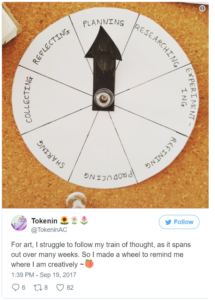(This column is posted at www.StevenSavage.com and Steve’s Tumblr)
As I write “A Bridge To The Quiet Planet,” I’ve started taking notes on my writing techniques.
Getting back into this was a bit tougher than I thought, so it took me awhile to get going. Fortunately I kind of got a writing system going again – only, as I used it, I had other insights.
So I figured, why not write them down for later?
This is something I hadn’t thought of before, but as I do so I find the act of reviewing these findings, these new techniques, and recording them helps my writing even more. I’m activley thinking about how to get better.
This is really classic Agile practice; you don’t just do things. You review them in order to improve. I strongly recommend every writer keep a list of “technique notes” and gradually review them. If possible, actually write up your techniques, maybe review them every work, to help build a system in your head.
This may sound a bit excessive, but so far? It’s helped me a lot.
Besides, it gives you something to share with other writers . . .
(Remember I do all sorts of books on creativity to help you out!)
– Steve
